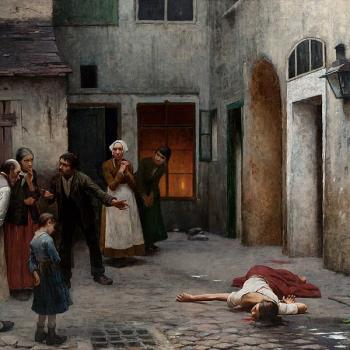
Before I do anything, I want to thank Public Catholic’s readers for their caring and kind suggestions and ideas about my problems with my mother’s dementia. I am in the process of following up on several of them.
You folks are the best.
Next, I want to apologize for going dead silent on you the past couple of days. My personal situation drug me down too far to write. But I’ll be back. I just needed time to deal with my own emotions.
I had a big tubful of hope when I put Mama in the hospital for an in-patient diagnostic. I thought that they would see the problem and come up with something to help my mother — and me — sleep through the night. The quickie convo with the doc Monday dashed those hopes to the ground. Help ain’t coming.
I’ve spent the past few days living in dry-as-dust land. My heart, my head, were full of dust. Maybe the reason I was so dusty is that I cried so much; tears of anger, tears of despair, tears of grief. I prayed and prayed. Then, I went through the angry phase, and again, I prayed and prayed.
Now, to use a phrase from my horsey days, I’m at the point where I can sit down in the saddle and ride. Sometimes, to paraphrase Robert Frost, the only way out is through.
Here’s a quick take on my feelings right now about what people face when they are trying to care for their parents.
First, we do not get any information from our docs. By that I mean that the only things I’ve learned about Mama’s medical situation have come from reading on the internet and attempting to diagnose her myself. Here’s a list of the information I’ve gotten about dementia, what to expect and how to handle it from our medical practitioners:
Did you hear the crickets chirping????
Now, here’s a list of the medical help and advice I’ve gotten about dealing with Mama’s many symptoms, including hallucinations, night terrors, etc:
Again, did you hear the crickets????
We once had a family doc who took a history, listened, and explained. This enabled her to treat Mama appropriately, and allowed us to take care of her at home. I had no idea at the time that this level of care was totally unique. When she retired, I began going from one doctor to another, trying to find someone who would replicate this level of care.
I’ve read a lot literature about dementia that comes out with this statement: You are not alone.
This is untrue. People who are trying to care for their parents with dementia are completely, absolutely alone. Unless they have a lot of money — and I mean a lot of money — the solutions that are offered to them are to (1) Warehouse their elderly parents in a medicaid nursing home where they will be left in bed all day and ignored, or, (2) Euthanize them.
This last is a real annoyance to me. Every time I write about my mother, some dirt bag tries to leave a comment advocating euthanasia. Every. Single. Time. The effect this has on me is to harden me toward people who advocate euthanasia. It also illustrates just how low we’ve fallen as a society.
The solution to this problem is not to warehouse people with dementia in sub-standard nursing homes with inadequate staff and a don’t-care attitude. I will also add, because it appears that I have to, that murdering them is also not a solution.
Euthanasia, death with dignity and all the rest of that rot are just nice names for murder.
If we spent a fraction of the effort advocating for help for people who are caring for their elderly parents with dementia that we spend on trying to pass laws to kill our elderly, we could solve the problem. Much, in fact most, of the problem lies with the medical profession.
I’m not sure when it happened since I’m healthy enough not to need much medical care, but we’ve arrived at the era of match-the-database-to-the-lab-results medicine. It seems that docs today don’t diagnose, they collate. The patient is totally secondary in their considerations.
Here’s an example from my past dealings with medical professionals. My husband and I took a weekend trip to Dallas a couple of years ago. I left Mama with the kids. She got sick and the kids took her to the er. The er doc ran a lot of expensive tests, including a cat-scan, said there was nothing wrong with her and sent her home.
I got a call in Dallas from that good ‘ole family doc — the one who took histories and listened to her patients — telling me that Mama had left a confused message with her answering service. I headed home to find Mama in desperate straits.
I took one look at her and knew what was wrong: She was dehydrated.
Me, with my master’s in business, did a better job of diagnosing than the doc in the er with his medical degree and all his tests. Why? I did something he evidently never considered. I looked at her.
This particular episode was the beginning of Mama’s won’t-drink-water spell. It was a little slice of hell, getting water into her. We had to work with her and work with her to get her to drink. Then, for reasons unknown, she started drinking again and we haven’t had that problem since.
She went through a similar period where she wouldn’t eat. We got her though that one, too.
Now, it’s night terrors, hallucinations and what I gather from reading on the internet is called “sundowning.”
I called a lot of docs this week, including several neurologists. It turns out that neurologists won’t see you unless you’re referred by another doc. One neurologist’s appointment maker told me that princess doctor wants all her patients to have an MRI and about a gazillion other expensive tests already done and in the chart when she meets them.
Think about that. This is many thousands of dollars worth of tests that she’s demanding without so much as knowing the patient’s name, sex, age, symptoms or anything about them. If that isn’t trying to diagnose by test, I don’t know what you’d call it.
What these folks don’t see is that medicine is more than collating test results with a database of illnesses. A computer can do that. In fact, I can do that. I have no medical training, but I’m plenty smart enough to collate databases. Medicine involves a serious interaction between doctor and patient that these docs have evidently been trained to avoid.
Without a full history and an exam that includes listening, not just to what the patient says but how they say it, without an application of actual clinical knowledge and skills that come from observing, listening to and treating real live people, medicine just doesn’t work.
If docs won’t believe what their patients tell them, then treatment is reduced to what can be replicated in lab tests or in front of the doc. If you have gastroenteritis, do you have to throw up in front of the doc to get something for nausea and vomiting? That’s where we’re heading. In fact, dementia patients and their caregivers are already there.
The danger of relying on tests alone is multifarious. First, as in the case of my mother’s dehydration, the doc may not order the right test. Second, without a history and an exam, the doc may not know how to interpret the test even if he or she accidentally orders the right one. Third, not everything shows up on a lab test. Fourth, even if the doc gets the right result — which is somewhat akin to throwing darts at a wall and hitting a bull’s eye, the patient is out of the loop. With long-term illnesses, the patient must be in the loop to get a good result.
Database collation medicine, or paint by numbers medicine, works very well most of the time. There are reasons for this. First, with most ailments people eventually get well on their own, even if the doc misses the diagnosis entirely. Second, the majority of aliments that people show up at their doc’s office with can be treated with a broad spectrum antibiotic and maybe something for discomfort.
In other words, most of the time, the doc doesn’t have to know what’s wrong with the patient. They can claim a victory just by prescribing a broad spectrum antibiotic and relying on the inherent resilience of well-fed, comfortably-housed Americans.
If things go past that 1, 2, 3 doh-ray-me level of medicine, they refer to specialists who provide a second layer of paint-by-numbers medicine.
The trouble in all this lies in the fact that when a patient gets really sick with something that requires a bit of actual medical practice, today’s docs appear to be utterly lost. They have a few buttons they push, labs they order and standard things they do. When it gets past that, they’re not much more use, and not more personal, than the internet.
What I’m trying to say is that if you get something really weird, you’re going to have to diagnose yourself. If you get something that’s not at all weird, that’s expected even, but that is complex, like, say, dementia, you’re going to have to treat yourself.
I’ve spent this week being down in the dumps for one simple reason: I was coming to the realization that my family and I are on our own with my Mama. We’re going to have to figure this out and provide the care that gets her through this, and we are going to have to do it ourselves.
Because the sloganeering claptrap out there is a lie. When it comes to taking care of your parent with dementia you really are alone.













